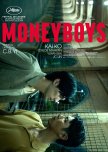
This review may contain spoilers
Loving Freely Isn't for Everyone
Journey to the Shore is one of the most painfully realistic portrayals of internalized homophobia, societal pressure, and the silent tragedy that queer youth face in conservative Korean society.Sang Beom is a boy who’s already been burned by homophobic bullying in his previous school, and now, even though he finds love again in Minha, he’s terrified to be outed. Minha, on the other hand, doesn't try to hide—he doesn’t care what others think, but that doesn’t mean he’s not hurting. In fact, he’s been hurting for a long time. The scars on his wrist say it all.
They both keep hurting each other unknowingly. Minha clings to Sang Beom like he’s his last strand of life. Sang Beom loves him too, but he’s suffocating under the pressure of fear and guilt. On their 100th day, when Minha is beaten and Sang Beom finally breaks down crying, the shift is devastating. That moment was heartbreaking—Minha realized he wasn’t just hurting himself anymore… he was hurting the only person he loved.
The film doesn’t point fingers. There are no villains here. Just pain, repression, love, and confusion. It ends in silence, and you're left to guess: did Minha die by suicide? All signs seem to say yes. But nothing is confirmed. That’s what makes it even more haunting.
Technically, the film is low-budget, but it doesn't matter. The acting is phenomenal. Everything—the shaky camera work, the mundane school setting, the rawness—feels intentional. This film didn’t need polish. It needed truth. And it gave us that.
This movie will leave you hollow, and that’s its strength. It lingers.
Was this review helpful to you?

This review may contain spoilers
Love in fearful world
Distant Place” isn’t a grand romance story, it's about fear of being seen different, growth and being with someone you love.One scene that refuses to leave me is the car scene — a masterclass in emotional restraint and silent heartbreak. Jin Woo’s outburst isn’t about Hyun Min. It’s about the years of internalized fear, shame, and survival. But sadly, he unloads it on the person he loves most.
Hyun Min’s calm response? It’s the kind of quiet ache you only see in mature love. He wasn’t asking for the world — only to be acknowledged. And that’s what broke me.
I see Jin Woo as a reflection of so many people shaped by rigid, conservative structures. Not everyone can fight back loudly. Some people only realize what they’ve lost when it’s already slipping through their hands. His arc — from silence to accountability — is one of quiet redemption.
The symbolism at the end — with the lamb being born — felt like a quiet metaphor. A beginning. A moment of standing up. Maybe for himself, maybe for them. Maybe both.
The cinematography is stunning, the emotions painfully real, and the storytelling — honest.
Watch it if you wanna see a man fearing to love, learning hard way and slowly trying to stand up for their love.
Was this review helpful to you?

Life: Love on the Line (Director's Cut)
0 people found this review helpful
You'll grow with them.
A story of two people growing in love, making mistakes, drifting apart, but always finding their way back to each other. This isn't just a romance — it's life itself. It’s about fear, change, time, and that one person you keep returning to. Life: Love on the Line didn’t just tell a love story, it made me feel loved, seen, and whole.📢Recommend watching this rather than the series.
Was this review helpful to you?

Emotions you're not ready for.
I went into Moneyboys expecting something light — maybe emotional, maybe tender — but I wasn’t prepared for how deeply it would unsettle me.Don't expect it be romantic drama. No! nope! It's to scars you. You sit there wondering their life choices. It’s a study of emotional repression, guilt, and the cost of surviving in a world where love is either punished or exploited. It’s slow, quiet, beautifully shot — but behind every pause and silence, there’s a scream waiting to happen.
The protagonist, Fei, is deeply flawed — emotionally distant, running from the past, and slowly unraveling through his relationships. He can't get over past inturn he's absent in the present. Unknowingly hurting people around him.
All the characters are written well, Lai, Long and Fei.
There are no big confrontations or perfect resolutions. Characters drift, disappear, die, or simply break. Every moment feels intentional — and every silence lingers. The ending left me hollow in the best (and worst) way.
Worth Watching?
Absolutely Yes — but go in knowing it’s not here to comfort you.
It’s here to ask:
What happens when love is buried beneath guilt? And is survival ever enough without forgiveness?
Was this review helpful to you?

Writing fell along with Rain
La Pluie begins with a refreshing premise — soulmates who can only hear each other when it rains. It promises emotional maturity and avoids many tired BL tropes in the beginning, with grounded pacing and real chemistry between the leads.But as the series nears the end, things start to unravel.
The emotional conflict feels forced, with key moments brushed off instead of addressed. Tai lies, avoids communication, and hurts Patt repeatedly — yet he’s never truly held accountable. His apology lacks depth, and somehow, he apologizes more sincerely to the side character than to the person he hurt the most.
The "soulmate" theme, while intriguing, ends up feeling shallow. The show leans too heavily on destiny instead of genuine emotional growth. By the finale, the story shifts from something grounded to something symbolic but empty.
✅ What worked:
Mature pacing and chemistry
Respectful intimacy and consent
Refreshing start and tone
❌ What didn’t:
Weak conflict resolution
Tai’s actions go mostly unaddressed
Overemphasis on soulmates instead of emotional accountability
Final Thoughts:
A strong start with a mid-tier finish. La Pluie had real potential, but its resolution lacked the honesty and depth it needed. Worth watching — just lower your expectations for the ending.
Was this review helpful to you?

This review may contain spoilers
Accountability and communication is necessary
Heaven × Candy had the potential to be a quiet, emotional tale exploring acceptance, vulnerability, and past wounds. For the most part, it was. The chemistry was believable, and the story had a grounded charm despite its low-budget, indie feel.But then came the cheating.
This isn’t just about a “bad character choice.” It’s about how the film treated that choice. The Towa cheats on Kenta not out of confusion or weakness—but as a direct, cruel reaction to his own jealousy over Kenta’s job in adult films. Kenta never hid his profession, and Towa entered the relationship with that knowledge. So instead of having a conversation—he retaliates by cheating. And the worst part? It’s never addressed. No apology, no remorse, no discussion. Just a reunion with a vague “I don’t want to lose you again” thrown in at the end.
It felt like the film skipped the most important emotional checkpoint. Love without communication is not enough. You can’t pretend betrayal never happened and wrap things up with a hug and kiss.
That said, I still found parts of the movie touching and aesthetically soft. It had its moments. But this lack of accountability made it hard for me to root for them as a couple by the end.
Was this review helpful to you?

This review may contain spoilers
Morally gray
Morally gray, emotionally chaotic — and weirdly satisfying.This movie will absolutely make you question everything.
It starts off strange, unexpectedly turns wholesome, then throws betrayal at you — not once, but twice — and just when you're bracing for a tragic spiral... it lands on a happy ending. I genuinely enjoyed the ride, even if it left a weird taste in my mouth.
It’s definitely an experimental film, not meant to be taken at surface level. It’s not everyone’s cup of tea, but if you’re into morally complex stories where no one is fully right or wrong — this might work for you too. I mean they all were wrong at one point.
I wanna talk about all three characters but that'll be too much spoiler, all I'll say is no one was absolutely right.
That ending was completely unexpected. You’d think with everything that happened, the story would tear itself apart. But instead, it leans into the mess and decides: “You know what? Let’s make peace with it.” And weirdly, that worked for me.
It’s a story that doesn’t want you to look too deeply into anyone’s morality. It just asks you to sit with the discomfort, the love, the betrayal, and the strange softness that remains when it’s all done.
Was this review helpful to you?

This review may contain spoilers
An Art film to discomfort you in best way.
This was my first time watching an art film, and it truly felt like a fever dream — disorienting, emotionally intense, and deeply symbolic. It's the kind of film that doesn’t hand you clear answers. Instead, it sits with you like a riddle, asking you to feel first and understand later.At its core, 30 Years of Adonis explores karma, suffering, and rebirth. There’s so much layered in the film I'm still having trouble processing it.
One scene that especially stuck with me was the graphic SA scene — it was hard to watch, yet strangely revealing. The more I think about it, the more I realize:
the entire film is explained in that one sequence.
He’s tied up = he’s bound by fate
He tries to resist = he fights back against injustice, life, and karma
He cries but endures = the soul screams, but the body is powerless
He gives up = the moment of surrender, or perhaps acceptance
It was the most emotionally devastating moment — not just because of what was happening, but because of what it symbolized.
Toward the end, we learn that everything Adonis went through was a consequence of his past life — his suffering was the karmic debt of someone who had caused harm. It feels cruel and unjust. How much pain is enough to repay a past life?
But despite that, the film leaves you with a quiet, lingering hope:
> Maybe, in his next life, he’ll find peace.
This isn’t a film for everyone — it doesn’t comfort, it doesn’t entertain in the traditional sense.
But it leaves something behind, something to ponder for a long time.
And I think that’s the point.
— Sanjana
Was this review helpful to you?

This review may contain spoilers
Love was never there
The movie is psychologically phenomenal.It is horror — but not in the way you might expect.
The most horrifying part isn’t gore or violence — it’s the realism of the characters.
Wine is a deeply lonely character.
He clings to anyone who fills that void.
If someone says they love him, he simply mirrors it — not because he truly loves them, but because he doesn’t know how to.
Love, to him, is whatever makes the loneliness stop — even briefly.
The men around him ,Tee and Boy are no better.
They take advantage of Wine’s need for affection.
And Wine lets them, because even if it's hollow, they still say they love him.
Nobody sees him as a person.
Only a body, a vessel for their desires.
Even Night — the quietest of them all — isn't a perfect contrast.
He’s passive. Emotionally distant.
His mere existence in Wine’s space is enough for Wine to cling to him too.
It’s not about connection — it’s about survival.
The story is devastating in a right way.
And the ending broke me.
The final scene — with Wine clinging to the guitar in jail — says everything about who he is.
Still waiting. Still holding on.
Still believing someone might come back for him if he just stays there long enough.
Sorry for spoiling but movie is damn good, not enough people appreciate it.
Was this review helpful to you?

This review may contain spoilers
Real or just Grand Guignol?
The first thought that popped into my head after finishing this film was:“Was any of that even real… or just part of the Grand Guignol?”
And I think that’s exactly what the movie intended — to completely blur the line between reality and performance, truth and theatre.
The film doesn’t hold your hand. It throws you into a stylized, disturbing world and says:“Interpret it.”
It had multiple heavy themes — grooming, manipulation, gore, horror — without ever being straightforward. You're constantly questioning what's real and what’s part of the show.
The symbolism?
Honestly… I didn’t catch all of it. Some of it went right over my head
But even then, the atmosphere, the tone, and the emotional discomfort hit exactly where they needed to. You don’t need to understand everything to feel the weight of it.
Despite how disturbing it is, I have to say:
The film succeeded in what it wanted to portray.
It left me haunted, confused, and thinking — long after the credits rolled.
Was this review helpful to you?

 1
1
